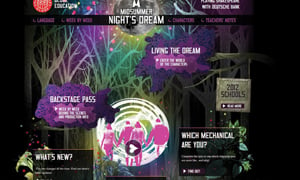The world’s a stage
Harper Ray explains how Globe Education is producing education resources that are as vivid for those further afield as for those attending the production

Almost 700,000 people visit Shakespeare’s Globe each year to enjoy a performance, see the exhibition or take a tour. A further 120,000 participate in Globe Education projects, courses and events. Yet these figures are a fraction of the 2.5 million visits to the website. Digital overcomes the limitations of physical geography and literally opens up a whole new world.
Each year Globe Education commissions a Shakespeare production for the Globe stage which retains Shakespeare’s language and is designed specifically to engage 11 to 16 year olds. In 2012 it was ‘A Midsummer Night’s Dream’. All tickets are free and in six years ‘Playing Shakespeare with Deutsche Bank’ has given over 60,000 tickets, worth more than £1m, to over 70% of London’s state secondary schools. More than a free ticket, there are accompanying in-school workshops and continuing professional development sessions for teachers.
The success and enthusiasm for this project grows each year but it is only accessible to London schools able to travel to Shakespeare’s Globe, and while Globe Education is one of the largest arts educators, it cannot deliver workshops in all schools across the UK. However, an accompanying micro-site brings the project alive as a vivid companion for those attending the production and is an effective stand-alone resource for those further afield.
In 2012 the approach to the digital resource mirrored the fresh and highly creative interpretation for the production. So too, the dedicated website is an informed resource about characters, themes and plot but it embraces a style which speaks ‘to’, not ‘at’, its audience and invites them into an active dialogue.
For teenagers, interactive functionality was central. This was evoked by character profiles set in a familiar social networking style. A ‘backstage pass’ offers a sense of exclusive chatty insights, accessible news-style blogs and production updates, rehearsal photos and interviews with the cast. Not forgetting teachers: a separate section provides a wealth of more seriously toned material.
Active learning, at the heart of Globe Education’s approach in all its work, is embedded in the website. Users are invited to contribute as part of the creative team. Interviews with the set designer, director and marketing team explain different elements of their work usually unseen by the audience. The briefs used by these real Globe creatives are posted and students encouraged to download them to design their own sets, costumes and posters. As further encouragement, some of the designs are published on the website. There is even an Agony Aunt section, where users can offer advice to the characters.
Putting the audience at the heart of the site and synchronising with Globe Education’s objectives for Playing Shakespeare with Deutsche Bank resulted in a dramatic increase for the site in the number of visitors, time spent and number of return visits. Page views on the micro-site more than doubled from 18,000 the previous year to over 37,000. A project which already supports learning in 70% of London schools is now, thanks to digital, available to schools nationwide and extends the Globe Education reach.
Join the Discussion
You must be logged in to post a comment.